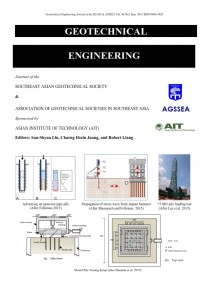Calcium Carbide Residue – A Cementing Agent for Sustainable Soil Stabilization
Main Article Content
Abstract
The high unit cost and energy intensive process in the production of Portland cement are the driving forces for the need to seek for alternative cementitious additives. Calcium Carbide Residue (CCR) has been recently introduced as a sustainable cementing agent. The recent research on the engineering properties of CCR stabilized clay as a subbase/base materials is reviewed and presented in this paper. CCR alone as well as a mixture of CCR and fly ash (FA) can be used for soil stabilization instead of ordinary Portland cement. The suitable ingredient of CCR, FA and clay results in a moderately high strength and durable geomaterial. The CCR fixation point obtained from the index test is proved as a practical indicator for determining the CCR content to obtain the required engineering properties. For a particular CCR content, the optimum water content is the most appropriate in terms of strength, swelling and durability against wetting and drying (wd) cycles. Significant strength and durability improvement is noticed when FA is utilized with CCR. The input FA at optimal content reacts with the excessive Ca(OH)2 from the CCR and this results in a significant improvement of the strength and durability. The strength analysis shows that the durability is directly related to the unsoaked strength (prior to the w-d cycles). Consequently, the relationship between the w-d cycle strength and unsoaked strength is proposed. It is useful for the quick determination of the unsoaked strength for mix design to attain the target strength at the design service life.
Article Details

This work is licensed under a Creative Commons Attribution-NonCommercial-NoDerivatives 4.0 International License.
Copyright © 2019 Association of Geotechnical Societies in Southeast Asia (AGSSEA) - Southeast Asian Geotechnical Society (SEAGS).


